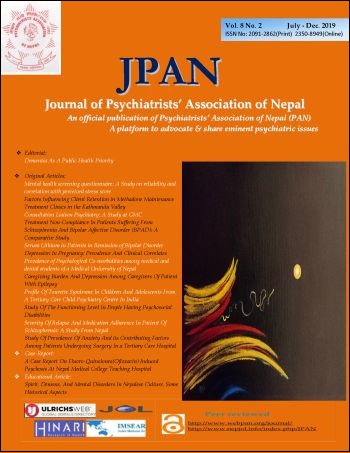Depression In Pregnancy: Prevalence And Clinical Correlates
DOI:
https://doi.org/10.3126/jpan.v8i2.28022Keywords:
Pregnancy, Mental Health, Depression, Risk FactorAbstract
Introduction: Pregnancy increases the risk of various psychiatric illness including depression. Such illness can result in prematurity, low birth weight and mother-child bonding. Depression is more common in women who have had negative experiences in previous pregnancies, have prior history of psychiatric disorder or are experiencing stressful life events. Unfortunately, psychiatric disorders among pregnant women are still undiagnosed and untreated, especially in developing country like Nepal. The aim of this study was to find out the prevalence and correlates of depression in pregnancy.
Material and Method: A cross-sectional, hospital based, descriptive study was conducted among 135 pregnant women attending Manipal Teaching Hospital’s antenatal clinic. Sociodemographic data and relevant clinical variables were collected using a predesigned proforma after obtaining informed written consent. The subjects were interviewed with Beck’s Depression Inventory (BDI). For the assessment of correlates, regression analysis was carried out. All statistical analyses were done using SPSS v 20.0. P values < 0.05 were considered significant.
Results: The prevalence of depression was 13.3 % according to BDI with additional 19% fulfilling criteria of mild mood disturbance. Factors such as history of sub fertility, pregnancy-induced illness and presence of domestic violence were found to be statistically significant predictors of depression during pregnancy.
Conclusion: Depression can occur frequently among pregnant women. Certain factors can be identified, which further increase the risk of such mental illnesses. Thus, pregnant women who are at high risk such as with pregnancy induced illness, have history of sub fertility, exposed to domestic violence etc., must be identified and diagnosed so that they can be treated timely.
Downloads
Downloads
Published
How to Cite
Issue
Section
License
This license enables reusers to distribute, remix, adapt, and build upon the material in any medium or format, so long as attribution is given to the creator. The license allows for commercial use.




